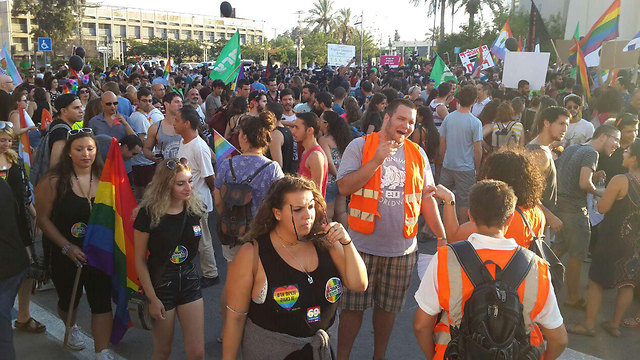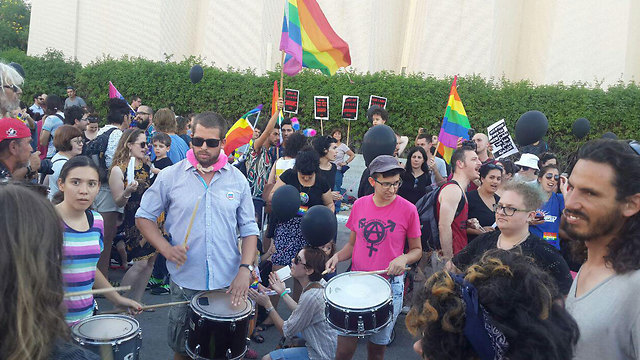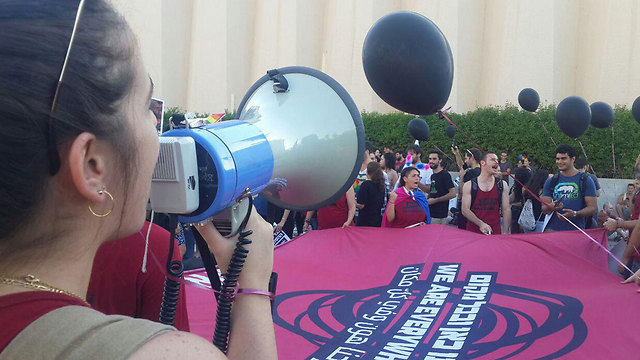Incensed with the Supreme Court’s decision to permit the police to divert the Pride parade fromt the main road, organizers cancelled the parade and protest instead; ‘We’re part of the country,’ say LGBT protestors.
More than 2,000 persons demonstrated on Thursday evening outside the Be’er Sheva City Hall building instead of marching in the city’s now-cancelled first ever Pride parade.
The protest came following the Supreme Court’s rejection on Wednesday of a petition submitted by the Israeli National LGBT Taskforce (also known as the Aguda) and Pride House (a local Be’er Sheva LGBT center), requesting that Be’er Sheva’s first ever Pride parade be allowed to march through Be’er Sheva’s Rager Boulevard, which acts as the city’s main artery.
“Revolution; the community wants support,” and “They won’t silence us” the protestors chanted. They also pointed blame at Be’er Sheva’s mayor, Ruvik Danilovich, directing some of their chants at him personally and at the police (“Policeman, policeman, whom are you protecting?”).
Dozens of protesters who sought to march on Rager Boulevard clashed with police.

“We want to show that we’re here, and that we’re staying here,” said Allen Bestacker, 18, who came from Dimona to participate in the protest that was decided on late the preceding evening.
“There’s a large bitterness here after everything that happened with the High Court of Justice and after the difficulties that the municipality and the police piled onto us,” he continued. “We want to show that we’re not second-class citizens. There are teachers here, nurses and professionals from every field, students. We’re part of the country. The goal is that next year, we’ll march on the route that we wanted, on the main road.”
“It’s important to me that people know that the community is ready to fight. The parade is not just a party, but a struggle. We’re not going to be satisfied with crumbs and being shoved to the sidelines by the city,” said Erez Wasilewski from Jerusalem.

He continued, “We’re part of the country, part of the city. There are gays not just in Tel Aviv, but also in Afula, Jerusalem and Be’er Sheva.In all those places, we want to feel safe and that we can express ourselves. The police’s job is to permit us to do so, not make easy work for themselves and letting extremist groups win.”
After Southern District Police Commander Deputy Commissioner David Bitan refused to grant the parade organizers a license to march, the Aguda and Pride House demanded to know his reasons. The police responded by stating that it had received information that there is a chance that there would be violence at the parade and that it had also heard from some of the protestors, whose apparent concern for their own safety led the police to direct the parade to a less central course.

Meretz Chair MK Zehava Galon condemned the court’s decision: “The Supreme Court gave in to the political deal between the (chief) rabbi of Be’er Sheva and the mayor, and it got a protest from people who weren’t ready to be shut up. You won’t put us back in the closet.”
MK Tamar Zandberg (Meretz) also came to the protest. She said, “The municipality should have thought of the young men and women, the gays and lesbians who live in Be’er Sheva, that the parade is a place of expression for them. There was excess conciliatoriness; the scales tipped in the wrong direction, and that’s a shame.”
As reported by Ynetnews
